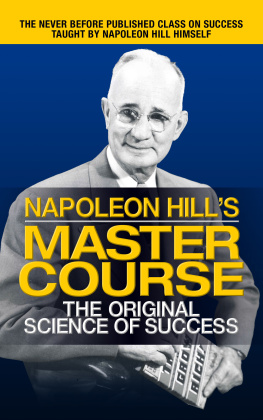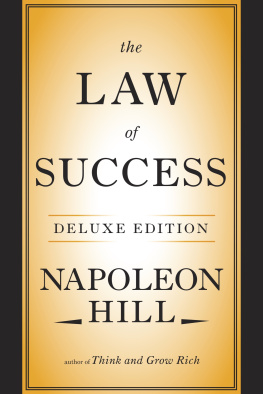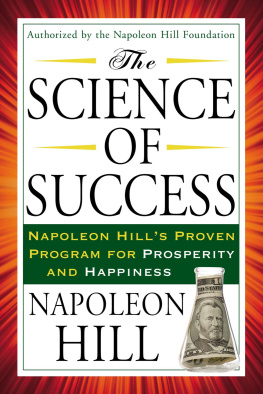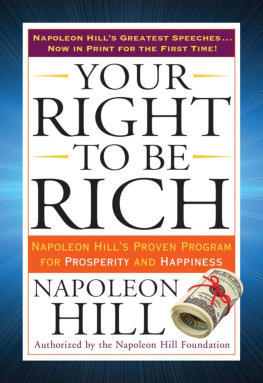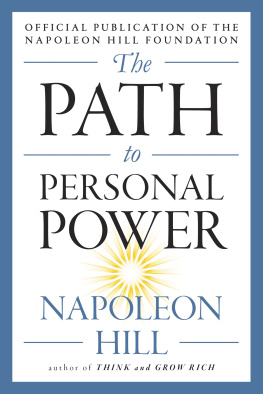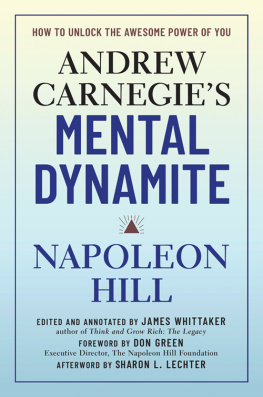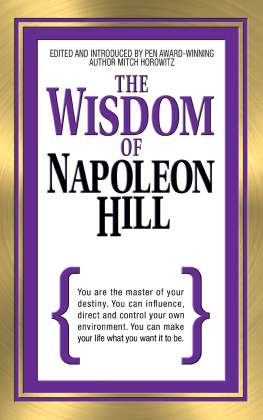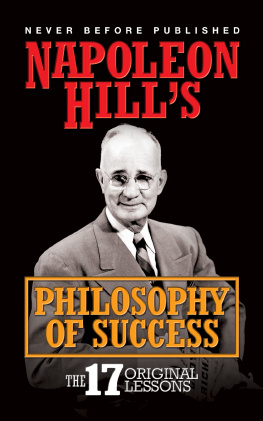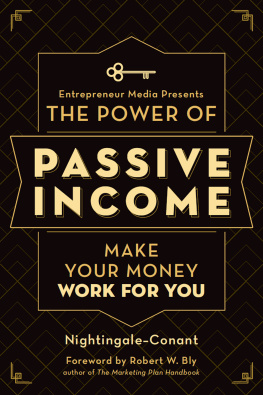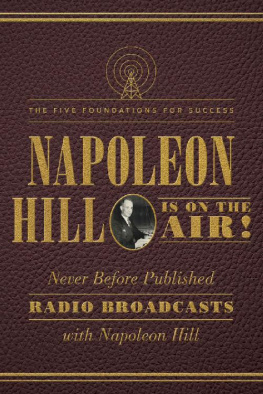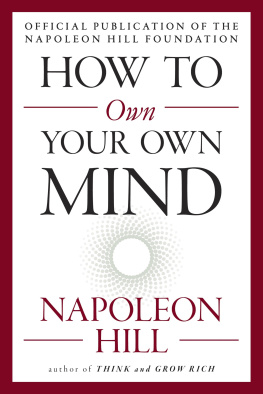Napoleon Hill - Napoleon Hills Master Course
Here you can read online Napoleon Hill - Napoleon Hills Master Course full text of the book (entire story) in english for free. Download pdf and epub, get meaning, cover and reviews about this ebook. year: 2020, publisher: G&D Media, genre: Religion. Description of the work, (preface) as well as reviews are available. Best literature library LitArk.com created for fans of good reading and offers a wide selection of genres:
Romance novel
Science fiction
Adventure
Detective
Science
History
Home and family
Prose
Art
Politics
Computer
Non-fiction
Religion
Business
Children
Humor
Choose a favorite category and find really read worthwhile books. Enjoy immersion in the world of imagination, feel the emotions of the characters or learn something new for yourself, make an fascinating discovery.
- Book:Napoleon Hills Master Course
- Author:
- Publisher:G&D Media
- Genre:
- Year:2020
- Rating:5 / 5
- Favourites:Add to favourites
- Your mark:
- 100
- 1
- 2
- 3
- 4
- 5
Napoleon Hills Master Course: summary, description and annotation
We offer to read an annotation, description, summary or preface (depends on what the author of the book "Napoleon Hills Master Course" wrote himself). If you haven't found the necessary information about the book — write in the comments, we will try to find it.
Napoleon Hills Master Course — read online for free the complete book (whole text) full work
Below is the text of the book, divided by pages. System saving the place of the last page read, allows you to conveniently read the book "Napoleon Hills Master Course" online for free, without having to search again every time where you left off. Put a bookmark, and you can go to the page where you finished reading at any time.
Font size:
Interval:
Bookmark:

NAPOLEON HILLS
MASTER COURSE
NAPOLEON HILLS
MASTER COURSE
The Original Science of Success


Published 2020 by Gildan Media LLC
aka G&D Media
www.GandDmedia.com
Copyright 2020 by The Napoleon Hill Foundation
No part of this book may be used, reproduced or transmitted in any manner whatsoever, by any means (electronic, photocopying, recording, or otherwise), without the prior written permission of the author, except in the case of brief quotations embodied in critical articles and reviews. No liability is assumed with respect to the use of the information contained within. Although every precaution has been taken, the author and publisher assume no liability for errors or omissions. Neither is any liability assumed for damages resulting from the use of the information contained herein.
First Edition: 2020
Front cover design by David Rheinhardt of Pyrographx
Interior design by Meghan Day Healey of Story Horse, LLC.
Library of Congress Cataloging-in-Publication Data is available upon request
eISBN: 978-1-7225-2419-7
10 9 8 7 6 5 4 3 2 1
This book consists of edited transcripts of audio recordings of lectures given by Napoleon Hill for his Master Course. It was delivered in Chicago in May 1954 to individuals who were being trained to teach his philosophy.
Contents
The Definite Major Purpose
This philosophy is based on seven major premises.
The First Premise
The first premise is that definiteness of purpose is the starting point of all achievement, because it is the starting point of all individual achievements. A definite purpose must be accompanied by a definite plan for implementation followed by appropriate action. You have to have a purpose, you have to have a plan, and you have to start putting that plan into action. Its not too important that your plan be sound, because if you find that you have adopted a plan thats not sound, you can always modify it. But it is very important to be definite about what youre going after, what your purpose is. There can be no ifs or buts about it. Before you get through this lesson, you will see why its got to be definite.
Just to understand this philosophy, read it, or hear me talk about it, wouldnt be of very much value to you. The value will come when you begin to form your own patterns out of this philosophy and put them into work in your daily life, your job, and your human relations. Thats where the benefits will really come.
The Second Premise
The second premise: all individual achievements are the results of a motive or a combination of motives. You have no right to ask anybody to do anything at any time without giving that person an adequate motive.
Incidentally, thats the warp and the woof of all salesmanship: the ability to plant in the mind of the prospective buyer an adequate motive for his buying.
There are nine basic motives. Everything that people do or refrain from doing can be classified under these nine. Learn to deal with people by planting in their mind adequate motives for doing the things that you want them to do.
A lot of people who call themselves salesmen have never heard of the nine basic motives. They do not know that they have no right to ask for a sale until they have planted a motive in the mind of the buyer for buying. The nine basic motives are:
1. Self preservation
2. Financial gain
3. Love
4. Sexuality
5. Desire for power and fame
6. Fear
7. Revenge
8. Freedom of body and mind
9. Desire to create
The Third Premise
The third premise: any dominating idea, plan, or purpose held in the mind through repetition of thought and emotion, allied with a burning desire for its realization, is taken over by the subconscious section of the mind and is acted upon through whatever natural and logical means that may be available.
In that paragraph, youve got a tremendous lesson in psychology. If you want the mind to pick up an idea and to form a habit so that the mind will automatically act upon that idea, youve got to tell the mind what you want over and over and over again.
When Mr. mile Cou came over here some years ago with his famous formula, Day by day, in every way, Im getting better and better, he cured thousands of people, but he didnt cure a great number more than that, and I wonder if you would know why. There was no desire, no feeling put into that statement. You might just as well blow in the wind as to make a statement unless you put some feeling back of it.
Incidentally, if you tell yourself anything often enough, youll get to where you will believe it, even a lie. This is funny, isnt it? But it happens to be true. There are people who tell little white lies (and sometimes theyre not so white as all that) until they get to where they believe in them themselves.
The subconscious mind doesnt know the difference between right or wrong. It doesnt know the difference between positive and negative. It doesnt know the difference between a penny and a million dollars. It doesnt know the difference between success and failure. Itll accept any statement that you keep repeating to it in thoughts or words or any other means.
Its up to you in the beginning to lay out your definite purpose, write it out so that it can be understood, memorize it, and start repeating it day in and day out until your subconscious mind picks it up and automatically acts upon it.
This is going to take a little time. You cant expect to undo what youve been doing overnight. Your subconscious mind bounces back by allowing negative thoughts to get into it. You cant expect that to change overnight. But you will find that if you emotionalize any plan that you send over to your subconscious mind and repeat it in a state of enthusiasm, backing it up with the spirit of faith, the subconscious mind not only acts more quickly, but it acts more definitely and more positively.
The Fourth Premise
The fourth premise: any dominating desire, plan, or purpose which is backed by that state of mind known as faith is taken over by the subconscious section of the mind and acted upon immediately. That state of mind is the only state of mind that will produce immediate actions through the subconscious mind. When I say faith, I dont have reference to wishing or hoping or mildly believing. I have reference to a state of mind wherein you can already see whatever youre going to do as a finished act before you even begin it. Now, thats pretty positive, isnt it?
I can truthfully tell you that never in my whole life have I failed to do anything that I made up my mind to do unless I got careless in my desire to do it and backed away from it or changed my mind or my mental attitude. And Ill tell you that you can put yourself in a frame of mind where you can do whatever you make up your mind to do, unless you weaken as you go along, as so many people do.
Again: any dominating desire plan or purpose which is backed by that state of mind known as faith is taken over by the subconscious section of the mind and acted upon immediately.
I suspect that only a relatively small number of people really understand the principle of faith and know how to apply it. Even if you do understand it, if you dont back it up with action and make it a part of your habit life, you might just as well not understand it, because faith without deeds is dead, faith without action is dead, faith without absolute, positive belief is dead. I dont know how youre going to get any results through believing unless you put some action back of that belief.
Next pageFont size:
Interval:
Bookmark:
Similar books «Napoleon Hills Master Course»
Look at similar books to Napoleon Hills Master Course. We have selected literature similar in name and meaning in the hope of providing readers with more options to find new, interesting, not yet read works.
Discussion, reviews of the book Napoleon Hills Master Course and just readers' own opinions. Leave your comments, write what you think about the work, its meaning or the main characters. Specify what exactly you liked and what you didn't like, and why you think so.

